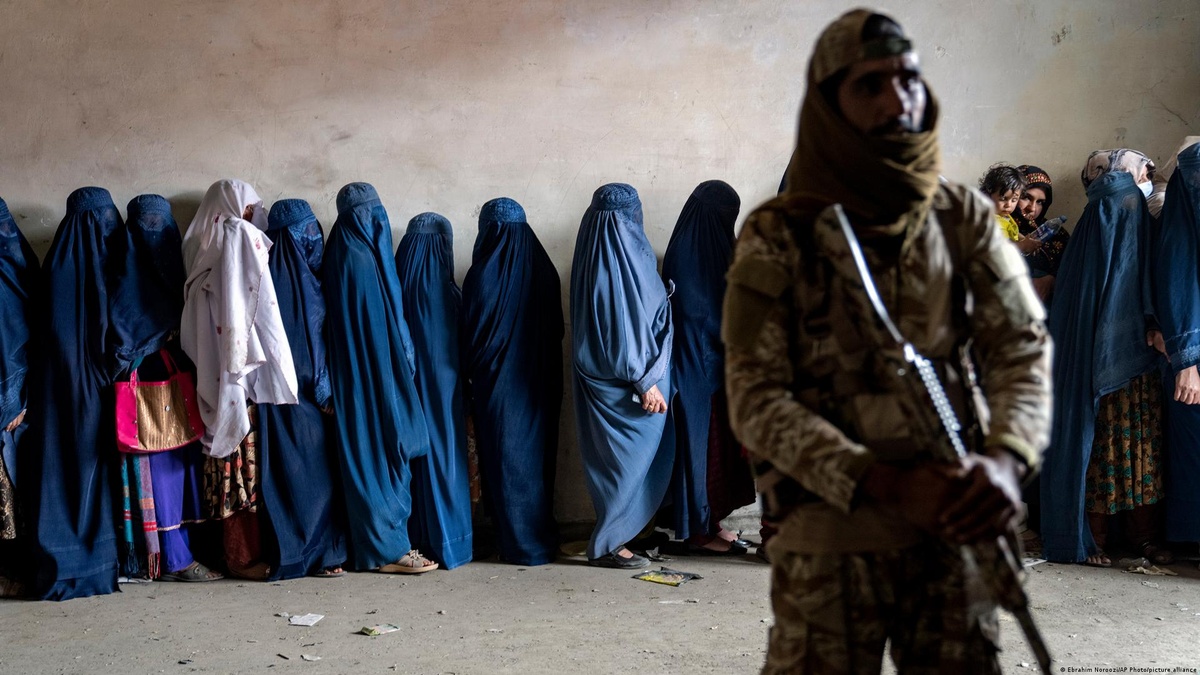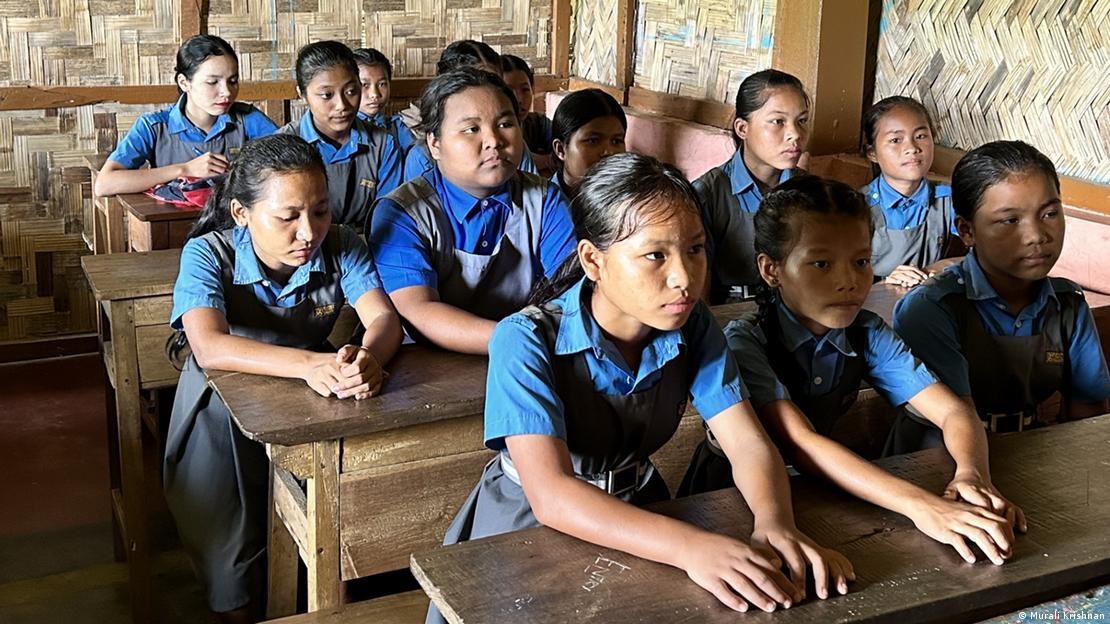|
 |
| New to the DW Asia newsletter? Subscribe here.
In this edition: As global interest in war-torn Afghanistan diminishes, many residents feel abandoned. In the two years since the Taliban retook control, they have imposed draconian restrictions on society, especially women and girls.
Plus: The far-right populist Alternative for Germany party rejects a values-based foreign policy, just as much as it rejects NATO and the US. That approach has attracted China’s attention.
On the ground in Tripura, India: An endeavor to provide education for children belonging to the marginalized Reang tribes of the northeastern Indian state of Tripura is bringing hope to some of India’s most vulnerable children.
DW on YouTube: Every week we feature a long-form, Asia-focused video from DW’s YouTube channels. This week, check out “Nasrin Sotoudeh – Protecting human rights in Iran” from DW Documentary.
These stories and more in today’s DW Asia newsletter.
– DW Asia team
Are you enjoying the new DW Asia newsletter? Please forward it to friends, family and/or colleagues you think may also appreciate it.
If you were forwarded this newsletter, click here to subscribe! |
|
 |
| The Taliban have imposed draconian restrictions on women and girls |
|
|
| Afghanistan: 2 years of Taliban rule ‘worse than feared’ |
|
|
| As global interest in the war-torn country diminishes, many Afghans feel abandoned. In the two years since the Taliban retook control they have imposed draconian restrictions on society, especially women and girls.
Read Shabnam von Hein’s report
“To be honest, I feel like I’m living a nightmare. It’s hard to comprehend what we’ve been through in the last two years,” Maryam Marof Arwin, 29, told DW over the phone.
Arwin, who lives in Kabul, founded an NGO called Afghanistan Women and Children Strengthen Welfare Organization, but it was seized by the Taliban two years ago — on August 15, 2021 — as they captured the Afghan capital and ousted the government of then-President Ashraf Ghani.
As US and NATO forces withdrew from the conflict-ravaged country following two decades of war, fighters from the Islamic fundamentalist group made lightning advances, conquering the entire nation in a matter of weeks.
Despite initial promises to respect women’s rights under Sharia, or Islamic law, the Taliban have since imposed draconian restrictions on women and girls. Most of them are barred from participating in public life, educational institutions and the labor market.
Women’s freedom of movement has also been severely restricted. |
|
|
 |
| Afghanistan’s Taliban rulers waved flags during celebrations in Kabul |
|
|
| Warnings even before the Taliban takeover
“I don’t really understand where the hope came from that the Taliban had changed or even become better,” said Arwin. “We always knew that with the Taliban in power, we would lose everything we had achieved.
“Twenty days before they came to power, we, women activists and civil society representatives in Kabul, organized a press conference to once again make the world community aware of our situation,” she pointed out.
“We said, ‘Look at the areas that were already controlled by the Taliban at that time and see how they despise women’s rights.’ But no one would listen to us.”
Even before they seized Kabul, the Taliban had gradually been gaining control of large parts of rural Afghanistan. In the areas under their control, women and girls were confined to their homes and traditional gender roles as daughter, wife or mother — not unlike what life was like under their previous rule, from 1996 to 2001. At the time, Afghan women and girls were not allowed to study or work, and were only allowed to leave their homes when accompanied by male relatives.
Women were often publicly flogged or executed if they violated Taliban rules.
Read the rest of Shabnam’s report |
|
|
| China courts Germany’s far-right populist AfD |
|
| The far-right populist Alternative for Germany party rejects a values-based foreign policy, just as much as it rejects NATO and the US. That approach has attracted the attention of Beijing.
Read Matthias von Hein’s report
A high-ranking three-member delegation from the Alternative for Germany (AfD) party recently traveled to China — on an official invitation. AfD co-leader Alice Weidel and her Bundestag federal parliamentary colleagues, Petr Bystron and Peter Felser, spent almost a week in Beijing and Shanghai at the end of June.
Upon their return, Felser told DW that he supposed it was his party’s good results in the German polls which had sparked the interest of the Chinese. The AfD is currently polling more than 20% nationwide.
Party head Weidel let it be known that their Chinese contacts had been very well-informed about the work of the AfD.
Weidel herself knows the People’s Republic of China very well. She spent six years living there on a German Academic Exchange Service scholarship and completed her doctorate on the Chinese pension system, before moving on to work for Goldman Sachs. Today, she praises the entrepreneurial spirit of the Chinese.
She has also ridiculed German Foreign Minister Annalena Baerbock’s criticism of the human rights situation in China.
“God help us: Baerbock is on a new mission in #China. She wants to emphasize the ‘shared European conviction.’ This already fails because it is not only #France which does not share this conviction…” she wrote on X (formerly known as Twitter) when Baerbock traveled there in April. |
|
 |
| AfD co-leader Alice Weidel has strong connections to China |
|
|
| AfD critical of Germany’s China Strategy
The AfD has positioned itself in opposition to the German government’s critical policy toward China. Berlin’s China Strategy, published in mid-July, for example, was denounced by Bystron, the AfD’s foreign policy spokesperson, as the “attempt to implement green-woke ideology and US geopolitical interests under the guise of a strategy for German foreign policy.”
The description of China in the strategy as a rival — as well as a partner and competitor — was for Bystron “the consequence of the US’ confrontational course toward China. This confrontation and division are not in the interests of Germany as an export nation,” he said.
For political scientist Wolfgang Schroeder from the University of Kassel, the AfD’s foreign policy positions demonstrate an attempt to set itself apart from the other German political parties. Geopolitically, said Schroeder, the AfD sees the traditional Western ties with the United States, which it regards as hegemonic, as having past their use-by date.
“The AfD considers Washington to be more part of the problem than part of the solution to the challenges facing Germany,” he told DW. “That’s because the AfD considers the US an imperial actor whose vested interests cannot be reconciled with those of Germany.”
Read the rest of Matthias’s report |
|
| On the ground in Tripura
India: How a tribal school in Tripura is opening new doors |
|
 |
| The Great India Talent School in Tripura is opening doors for many young Tribal students |
|
|
| An endeavor to provide education for children belonging to the marginalized Reang tribes of the northeastern Indian state of Tripura is bringing hope to some of India’s most vulnerable children.
Read Murali Krishnan’s report from Tripura
Maslan Reang, 13, cannot hold back her happiness on seeing her classmates in school after the weekend. She greets them warmly and looks forward to the English class which is about to begin.
“We are now beginning to write small essays… Sometimes, I make mistakes while using tenses, but I am learning every day. By the end of the year, I hope to be good,” Maslan told DW.
Lal Monkima, a class 8 student, is equally excited about attending school. His forte is mathematics.
“I love the subject. I didn’t know that problem-solving could be so joyful. One day, when I master the subject, I will be a teacher,” Monkima says.
Both Maslan and Monkima are students of the Great India Talent School in remote Kashirampara, about 160 kilometers (99.5 miles) from the state capital, Agartala. The school is the first such attempt to bring together tribal children to school.
What started as a modest experiment in 2017, providing lessons to students from kindergarten to class 3, has since grown and the school now has nearly 700 students who can study till class 8.
Read the rest of Murali’s report |
|
| Do you have questions or comments about the DW Asia newsletter?
If so, drop us a line and we’ll try to address them in an upcoming newsletter. |
|
| follow dw for breaking news |
|
|
|
|
![]()
![]()